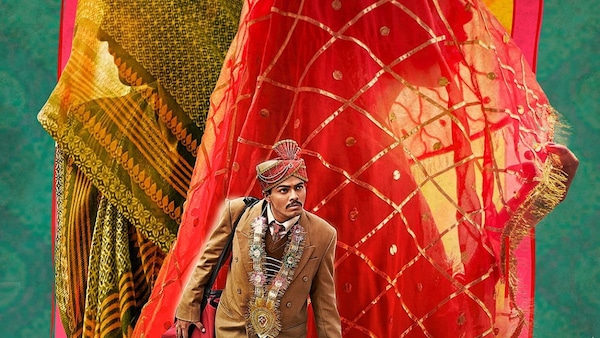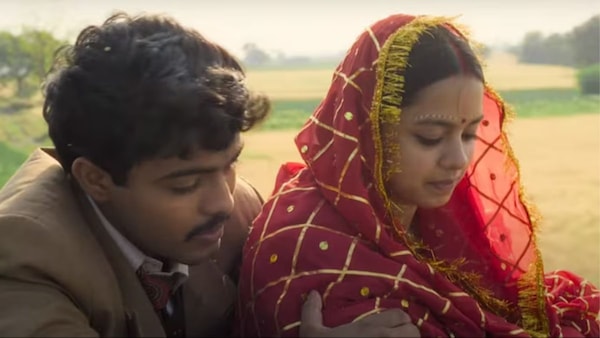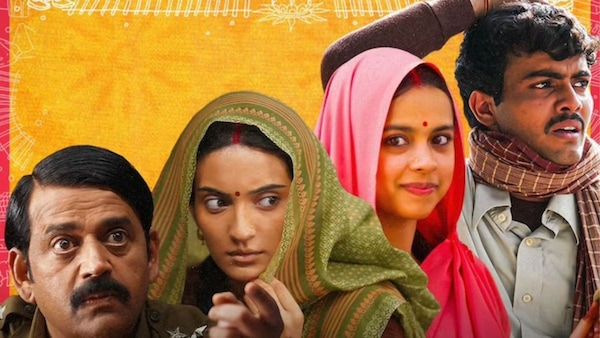Laapataa Ladies Is A Biting Feminist Satire About The Lost & The Found
Laapataa Ladies is a fun, revisionist narrative where all the pointers of patriarchy are turned on their head, but at the same time, it treats feminism as a learned process and not a quick solution.

Last Updated: 03.57 PM, Mar 02, 2024
KIRAN RAO’s Laapataa Ladies is a glorious instance of lost and found. Not least because the premise centres on two newly-wed brides who get lost in the maze of mistaken identities only to be eventually found. It is because the film, charming and endearing in equal measure, feels too on the nose for a while till it finds its way and culminates in a moving finale. The filmmaker’s sophomore feature is a captivating example of assured writing and winning performances that rise above moments which are imbued with such literal messaging that a lesser film would have capsized. Not Laapataa Ladies.
The year is 2001. In the national context, Kaho Naa... Pyaar Hai was released a year prior and the debut male actor Hrithik Roshan has catapulted into stardom. Under the leadership of Sourav Ganguly, the Indian men’s cricket team is gathering strength against foreign opposition (both get callbacks in Rao’s outing). And somewhere in rural India, a local train is punctuated with a common sight. Its occupants include several pairs of brides and grooms — the generic shade of brown suits matched with the gaudy red. The men sit with their legs stretched while the women have their faces covered with veils. Inside the compartments, there are free-flowing conversations about dowry.
Among, and unlike, them are Deepak (Sparsh Shrivastava) and Phool Kumari (Nitanshi Goel), a restive new married couple waiting for their station. When their destination does arrive, Deepak hurriedly disembarks, all the while attentive of his bride coming along. But the joy of their homecoming is cut short when the veil is lifted and revelation strikes: the woman Deepak has come with is not Phool. She calls herself Pushpa Rani (Pratibha Ranta). In all the haste, he got down with someone else while Phool mistakenly stayed back in the train. She later finds herself at an unknown station with an unknown groom, completing the cycle of confusion.

The central idea of Laapataa Ladies shares its genesis with Rabindranath Tagore’s 1906 novel Noukadubi (Boat Wreck) where a blinding storm caused a similar confusion. Rao’s film, written by Sneha Desai and Biplab Goswami, does not officially acknowledge the source but its subversion — where a typical male saviour story is transformed into an agential feminist tale — confirms the lineage. For instance, while Deepak makes rounds of the police station, it is Pushpa Rani, unfazed by the commotion, who plots more accessible plans.
In fact, the two women are as different as they could be. Phool, stranded in the railway station, is reluctant to utter her husband’s name, much to the dismay of the station master. She knows her way around the kitchen but has no idea about the name of the place she stayed in or the village she was supposed to go to. When she is afforded shelter by a woman who runs a tea stall, Phool is told that the idea of “a respectable woman” is the source of all fraud. The older, more jaded and bitter woman, has seen more of the world; with a cat as her companion, it is she who utters the line of the film: “they say the man who loves you has the right to abuse you” – a sentiment Phool Kumari too was probably trained to believe. On the other hand, the self-assured Pushpa Rani is a woman with a plan. She thinks on her feet, says her husband’s name out loud, dispenses wisdom about organic farming, and gently coaxes Deepak’s sister-in-law to take up sketching. She also hides her real identity.
It is difficult to overlook Rao’s urban gaze here that assumes a woman, belonging to the same milieu as the rest, will know better. There are also several scenes where the need to dispense a social message overrides the subtle disposition of the film. Like an older woman telling a younger one that women are capable of being so self-sufficient that men can be rendered futile. But the filmmaker also infuses her work with such warmth and simple pleasure that it is difficult to not be taken by it. When a male police officer showcases his liberal slant by conceding the presence of his female colleague, he adds “sports quota” in the same breath; the same bribe-loving official later offers concessions when a convict’s mother persuades him with singing.

Even the dialogues are a delight – when Phool shares that the name of her husband’s village is after a flower, the people at the station are sent into a guessing marathon; the running gag concludes with a crackling line from the disheartened small crowd: “Bhawra bana ke rakh diya hai sabko (You have turned us into bees)."
But the true merit of Laapataa Ladies lies in the minute way Rao imagines a fictional space by the perceptive gentility of the female gaze. Every scene is designed by intent. Take for instance that moment where Phool, realising that she is on her own at a deserted station, scurries and hides behind a “use me” dustbin. Or the fact that the two husbands in the film are named Deepak and Pradeep (both named after ‘light’) while the women are called Phool and Pushpa (both meaning ‘flower’ — that the latter’s real name turns out to be Jaya, meaning victorious, adds to Laapataa Ladies’ tendency to be literal). Consider also that the two stations which become the missing sites are called “Murti” (idol) and “Pateeli” (vessel), denoting the binaries in which a patriarchal society is conditioned to view women: either as domesticated beings in the kitchen or as elevated goddesses in temples.
It is tempting to look at Laapataa Ladies as a fun, revisionist narrative where all the pointers of patriarchy are turned on their head. The veil is lifted, and the vidaai (the tradition of a bride’s farewell from her marital home) is revamped as an act of self-reckoning. Women refuse to be pitted against each other (a track of a warring daughter-in-law and mother-in-law is treated with utmost tenderness), men are portrayed in simplistic duality (Deepak is nice and Pradeep is terrible), and the enforcer of law is morally ambiguous. But Rao’s film inhabits the nuance to treat feminism as a learned process and not a quick solution. The women lose and find themselves but the discovery is lent the dignity of a journey; the faces make an appearance but the veil does not vanish, a married woman utters a husband’s name in a moment of duress but it waits to be seen if it was reflex or the origin of a practice.
Laapataa Ladies is a biting satire that underlines the joy of a feel-good, formulaic film done well. And it feels inventive for the fresh cast that Rao has gathered. Sparsh Shrivastava as Deepak is phenomenal. He is sincere, aching in his sadness. There is a particular scene where he says “I love you” to his wife as an example of his English-speaking proficiency. His face evokes a myriad of emotions, ranging from a sense of achievement to sudden joy. The two women Nitanshi Goel and Pratibha Ranta are compelling in their turns; their portrayals are evidence of the affecting written word. But it is Ravi Kishan as the police officer who is all-round terrific.
This is his territory and Kishan does everything right – the way he speaks with a mouth full of paan, follows around a woman when he gets the slightest hint that he can leech off money from her, and later lets someone go on realising her strength and not necessarily his folly. It is not entirely ironic that in a story about missing women, the most memorable character is the cop who had no role in finding them. After all, his corrupt inefficiency sustained a crucial truth: sometimes, women can find themselves only when they are lost.

